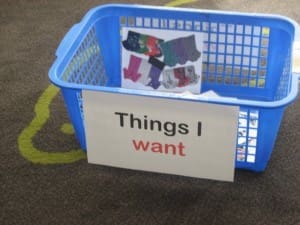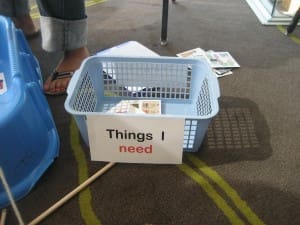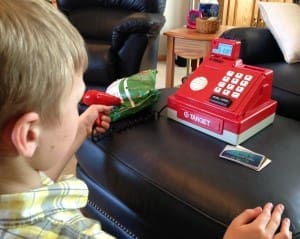That is the question. Allowance that is.
Up until March 2013, I was in the ‘not to allow’ category. More by default than by purpose. But then my son committed a kid-sized crime and it served as the catalyst to quickly change our financial ways.
Let me set it up for you. The scene is Disneyworld. The timeframe is spring break. The innocent bystander is Grandma. The offender is my 7 year old son. The conduct in question: My son demanding his Grandma to purchase him expensive Disney merchandise. The weapon was his mouth at a very loud volume. Let me just say it was not pretty. There were many eyewitnesses.
If the case had gone to trial, the verdict would be: You need to do a better job of teaching your child about money. But in a plea bargain, we agreed to get our son help. Yes, we were sentenced to a lifetime of financial literacy.
There is nothing like a trip to Disneyworld to make you evaluate how you handle money. After every ride, Disney ever so elegantly ushers you into a store selling never-seen-before toys and trinkets that are similar to the theme of the ride you have just completed. Swords and hooks after you cruise with Pirates of the Caribbean and life size Woody and Zurg dolls after Toy Story Mania. It’s enough to make even the most financially disciplined adult weak in the knees.
Now imagine a 7 year old. They can only help but to succumb to the pressure of this sly marketing scheme. It wasn’t that my son wanted something, that is understandable. It was that he didn’t take no for an answer. He demanded that his Grandma fork over the money when we refused, like it was expected of her. It was his attitude that he deserved something and that $100 was no big deal. That night, while he wrote 20 times “I will not demand Grandma to buy me something,” I vowed that when we got home, we were going to tackle this issue and do a better job of teaching our kids how to handle money.

Let me share with you a few tips I have learned along the way:
1. Show me the money! Think Cuba Gooding Junior on this one. Kids need to see the cash to actually understand the concept of it. It’s even better if they feel ownership of the money, which is why we instituted an allowance system. Teach them about the life-cycle of money. Work – paycheck – taxes – bank – bills. Most kids think money comes from the ATM machine. Let them see you making purchases with cash. Better yet, plan a visit to the Federal Reserve Bank of Minneapolis – I just signed us up for a tour in May! I visited a United States Mint growing up and it left a huge impression on me in terms of understanding how money is made so I was thrilled to take the boys there last year on a trip to Denver.

2. Some allowance money should be tied to chores, but not all of it. Adults are not given financial handouts, kids should not learn to expect them either. I like to think of our allowance structure as base + commission. They have a few chores around the house that are just part of being in this family like taking care of the dishes and cleaning their rooms. They each get $5 every 2 weeks as their allowance. We have assigned monetary rewards to certain chores that go above and beyond the standard household ones. The boys make deposits to their bank accounts at our credit union when their piggy banks become too full or they receive a larger sum of cash for a birthday or holiday present. Our credit union has a fun program called Bean Sprouts with lots of kid-friendly information on how to make your money grow. Because our world is becoming more and more digital (and because I am SO OVER the sticker chart), we are in the process of transferring our chore/allowance tracking system to My Job Chart. This is a free website where you create an account for each kid and assign chores to them with a deadline and a corresponding amount of points that are awarded upon completion. Kids then learn how to save, spend or share these points. Choremonster is a similar website that is appropriate for younger kids.

3. We do not pay for good grades or good behavior. I want them to develop an intrinsic motivation for doing well in school. Good behavior should be the basic expectation and I offer verbal praise for their effort, not monetary gain, when they are being good. I don’t want my kids to think that everything they do needs to be tied to a financial reward. The last thing I want is for them to develop greediness.
4. Teach kids the importance of following a budget. Something my dad taught me when I was young was that a portion of my money should go for saving, spending and giving. Older kids can understand the concept of short term savings and longer term savings or investing. For each family, the percentages assigned to each of these may be different. Decide on an amount and then follow through with it. If your child has a goal for something they would like to purchase, project how long it will take to save for it or how it will work into the existing budget. Try to re-evaluate the budget at least annually. The sooner you start doing this with your child, the better, but it’s never too late to start. I found this one online at the PBS kids website.

5. There is more value in work than just the financial reward it brings. We all know that some of the most rewarding careers are not the most lucrative ones. The saying “It is better to give than to receive” is true. With your children, do things for others who cannot help you in return. Show your kids how good it feels to help others in need. Volunteer together at a community organization. At Christmastime, participate in Toys for Tots or a similar program to make an impact on your kids.
6. If you cannot pay for it in cash, you cannot pay for it. My son got $20 from his great-grandma for a birthday gift and he wanted a Nintendo DS game that sold for $25.00. He had to wait until he got more cash to pay for it. He begged for an extension of his allowance, but we did not give it to him. Kids need to know about the convenience and the dangers of credit cards and how they work in relation to purchases made with cash. Playing games like Monopoly or Life may help kids understand the importance of this, for when you are out of money, you are out of the game. Cashflow for Kids is another game that teaches kids about the principles of cashflow, capital gains, assets and liabilities in a fun and entertaining format.

7. Delaying gratification is an important lesson in life. And one that I am still learning. Sometimes it’s hard to see other people who have really nice things and be satisfied and content with what you have. Yet time and time again, research has proven that money does not buy happiness. I want my kids to learn that life is not about material things. Labeling 2 separate bins and then having kids place pictures of different items in the appropriate bin is one hands-on activity we have done that has helped them understand the difference between wants and needs.


8. Make sure your kids understand the real reason for not buying something. I learned this one early on. While at Super Target, I once told my son ‘no’ to buying a Lego set because we “don’t have the money.” It was ~$75. After picking up some groceries and incidentals, we headed to check out where the total of our bill was $80. My son had a horrified look on his face because I had just told him we didn’t have the money. What I should have said is that we are choosing to spend our money on something else.

9. Have perspective. Living in America, we are technically wealthy. If your family has an income of at least $30,000, that puts you in the wealthiest 1% of the world. If anyone has traveled to a 3rd world country, it does not take long to make you feel incredibly grateful and thankful for the things that we have. Approximately 854 million people in this world go to bed hungry every night, many of them children. While my kids are begging for an iPod touch or the newest e-reader, some child is simply begging for a meal. This disparity is difficult to talk to our kids about, but I think it’s an important one. One friend went as far as to institute Poverty Week at his house after his teens whined relentlessly about the food that was being served and their lack of name brand clothing. Eating only rice and beans, sleeping on the floor without a pillow, and wearing only one change of clothes for an entire week will be implemented in our home if necessary.
10. Be a role model – kids will learn most financial habits from YOU. My sons see me clipping coupons for groceries and doing price comparisons on bigger items we are purchasing. They remember washing the dishes by hand while we waited for Sears to put their dishwashers on sale when ours broke. They also see my frustration when I make poor financial decisions in the moment – like spending too much money on expensive noise cancelling headphones only to have them break weeks later. As moms, a lot of times we are just going through the motions and crossing items off our “to-do” list and we forget to really explain things to our kids. I am trying to be more intentional about verbalizing my thought process with my kids so they can better understand the underlying rationale I use when making financial decisions, big or small.
Fellow moms and members of the jury, I would love to hear from you! How do you teach your kids about money?
Shine On-
Karri
For more information on financial literacy for your family, you can visit Junior Achievement or T.Rowe Price Associates. Dave Ramsey is a personal favorite and he just wrote a book Smart Money Smart Kids with his daughter, Rachel Cruze. As soon as it comes out in paperback, I will be buying it.

12 comments
Karri – this is GREAT! It’s workshop material for parenting classes! We feel fortunate that our kids (5 and 8) understand the value of money, respect the work that goes in procuring it and are already familiar with delayed gratification. This article is giving me good perspective on how to implement an allowance, and great reference tools. Thank you!
Thank you for your comment Karina. Its been a work in progress for us, as I am sure it has been for you too!
This is a really great post! I really like the suggestions! My son is 10 and we are dealing with the whole entitlement issue in a big bad way. I think I feel a poverty week in our future!
Thanks for this!
If you do poverty week, let me know. I haven’t had to do it yet, but I can foresee it in our future. My kids feel entitled to much these days! Thanks for reading.
Such a timely and great article Karri! Dave Ramsey has a very similar kit you can get too and is a great resource for teaching your kids on how to handle money!
Hi Amy, thanks for reading. I love Dave Ramsey! My husband and I taught Financial Peace University and I have looked at the kid kit, I just don’t want to have to pay so much for it! haha…
Great post, Karri! Love all the tips and references!
Thanks Jen. What have you done with your older kids that has worked. Do they teach this in middle or high school a little? It seems like Home Ec type education has been dropped from many curriculums…
Great post Karri! A topic relatable & relevant to all of us- with great tips
Thank you Rach! (Wicks wicks, wink wink) 🙂
Great info! We go back and forth on this all the time and haven’t figured out a good way to implement this in our family. I will definitely be reading this again and looking at the links you shared. Thanks for being willing to share!
We have gone back and forth and debated this as well and really didnt do anything until it became necessary. I think its going to be a constant battle in our home! Thanks for reading!